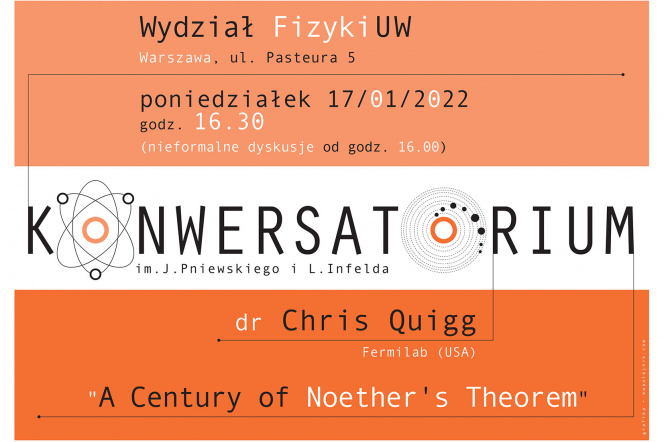Data dodania: 2022-01-11
17.01.2022, Konwersatorium/Colloquium (online) - A Century of Noether's Theorem

[for English see below]
Szanowni Państwo,
W poniedziałek 17 STYCZNIA, O GODZ. 16.30 odbędzie się pierwsze w 2022
roku KONWERSATORIUM im. Jerzego Pniewskiego i Leopolda Infelda Wydziału Fizyki UW. Spotkanie będzie miało wyłącznie formę ONLINE (obowiązuje rejestracja).
Naszym gościem będzie:
dr Chris Quigg, Fermilab (USA),
który wygłosi wykład:
"A Century of Noether's Theorem".
Prelekcja przybliży nam osiągnięcia naukowe i osobę Emmy Noether,
naukowczyni,
która 100 lat temu sformułowała i udowodniła słynne twierdzenie wiążące
symetrie
z zasadami zachowania w fizyce.
Abstrakt wykładu znajduje się poniżej treści niniejszej wiadomości.
*** Rejestracja ***
o Osoby, które uczestniczyły w poprzednim Konwersatorium, w dniu
13.12.2021 NIE muszą się rejestrować.
Dostęp do wykładu zapewni im link otrzymany przy rejestracji dokonanej
poprzednio.
o Osoby, które nie uczestniczyły w poprzednim Konwersatorium proszone są
o rejestrację na spotkanie poprzez kliknięcie na link:
Po zarejestrowaniu się otrzymają Państwo potwierdzenie e-mailowe z
informacjami jak dołączyć do spotkania.
o Zachęcamy do podawania podczas rejestracji służbowych, a nie
prywatnych adresów email.
o Zachęcamy do niepozostawiania rejestracji na ostatnią chwilę. Osobom
rejestrującym się
późno nie gwarantujemy dołączenia do spotkania o czasie.
*** *** ***
Na nieformalne rozmowy zapraszamy od godz. 16.
Z wyrazami szacunku,
Barbara Badełek
Jan Chwedeńczuk
Jan Kalinowski
Jan Suffczyński
------------------------------------------------------------------
[for English see below].
Dear Colleagues,
On Monday, 17 JANUARY, at 4.30 p.m., the first in 2022 Jerzy Pniewski
and Leopold
Infeld COLLOQUIUM of the Faculty of Physics of the University
of Warsaw will take place. The meeting will be exclusively ONLINE
(registration required).
Our guest will be:
Dr. Chris Quigg, Fermilab (USA),
who will give a lecture:
"A Century of Noether's Theorem".
The lecture will introduce us to the scientific achievements and the
person of Emma Noether, a scientist
who 100 years ago formulated and proved the famous theorem linking
symmetries
with the conservation laws in physics.
The abstract of the lecture can be found below this message.
*** Registration ***
o Those who attended the previous Colloquium on 13.12.2021 do NOT need
to register.
Access to the lecture will provide them with the link received at the
registration made previously.
o Those who did not attend the previous Colloquium are asked to register
for the meeting by clicking on the link:
After registering you will receive an e-mail confirmation with
information on how to join the meeting.
o We recommend to provide professional email addresses, not private
ones, when registering.
o We encourage you not to leave registration to the last minute. Those
who register late will not be guaranteed
to join the meeting on time.
*** *** ***
For informal discussions, please join us starting at 4 pm.
With best regards,
Barbara Badełek
Jan Chwedeńczuk
Jan Kalinowski
Jan Suffczynski
-----------------------------------------------------------------------------------
dr Chris Quigg, Fermilab (USA)
"A Century of Noether's Theorem"
In the summer of 1918, Emmy Noether published the theorem that now bears
her name,
establishing a profound two-way connection between symmetries and
conservation laws.
The influence of this insight is pervasive in physics; it underlies all
of our
theories of the fundamental interactions and gives meaning to
conservation laws
that elevates them beyond useful empirical rules. Noether's papers,
lectures,
and personal interactions with students and colleagues drove the
development of
abstract algebra, establishing her in the pantheon of twentieth-century
mathematicians. This essay traces her path from Erlangen through
Göttingen
to a brief but happy exile at Bryn Mawr College, illustrating the
importance
of "Noether's Theorem" for the way we think today.
10 wyświetleń
Więcej
-
2023-03-06
Nowy numer Postępów Fizyki
-
2023-02-01
Spotkanie online



